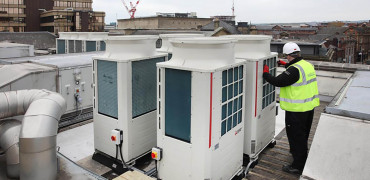The year is 2019. The UK becomes the first major economy to legislate a commitment to cutting emissions and ceasing further contribution towards global warming.
Already having agreed to limit global temperature rises to 1.5◦C under the 2015 Paris Agreement, the UK passes its legally binding target of net-zero emissions by 2050.
The target is passed with strong support and cross-party consensus, with the Conservatives, Labour, Liberal Democrats and Plaid Cymru all in agreement that this target would address climate change whilst also driving economic growth.
Since then, the UK has shown determination in advancing greener policies and transitioning towards renewables to decarbonise both the private and public sectors.
In a report by the Climate Change Committee (CCC), they have confirmed that the UK has achieved all three carbon budgets to date – this means if you were to exclude emissions from aviation and international shipping, the UK has successfully cut emissions to less than half the levels in 1990.
Though this ought to demonstrate the conviction and credibility of the nation in reaching net-zero by 2050, we are somehow witnessing a rise in net zero scepticism.
For every $1 spent on climate resilience, $13 worth of damages and clean up costs are saved
Climate scepticism
As of March 2025, the Conservative Party has ditched their commitment to net zero, with leader Kemi Badenoch announcing that the target was impossible to achieve and claiming that it cannot be reached “without a significant drop in our living standards, or worse, by bankrupting us.”
Across the pond, in the United States we are witnessing a similar phenomenon, with President Donald Trump withdrawing from the Paris Agreement and removing public records which contain any mention of the climate crisis .
“Drill baby, drill” is the motto carried by the Trump administration as they discard clean energy policies and ramp up fossil fuel production.
Considering such strong backpedalling on legally binding commitments, one would assume that these actions are based on concrete evidence illustrating either climate change being a “hoax”, climate targets being detrimental to our economies or that net-zero targets are in fact unachievable altogether.
However, the evidence and the scientists are both telling a completely different story.
The Global Impact of Climate Change
For years, politicians such as Donald Trump have spread the rhetoric that climate change is a “hoax” and that the effects of climate change have been wildly exaggerated. Yet according to Prof Stefan Rahmstorf (the Potsdam Institute for Climate in Germany), global warming has been continually advancing exactly how it was predicted in the 1980s.
In fact, its devastating effects have already reached millions across the world.
On 19th March 2025, the United Nations announced that 151 unprecedented climate-related disasters hit the world in 2024, including record breaking heatwaves, flooding and storms.
These findings are derived from a report published by the UN’s agency World Meteorological Organization (WMO), which confirms that our current world is on a destructive path propelled by our ongoing consumption of fossil fuels and lack of haste in mitigating emissions.
In Valencia, 205 people were tragically killed and many more injured as a result of flooding and landslides. Scientists from the World Weather Attribution (WWA) concluded that global warming causes torrential rainfall to hit Spain around 12% heavier and it is now twice as likely to occur.
Similar devastation hit in other parts of the world, with the Philippines facing six typhoons in less than a month, Florida experiencing its most powerful hurricane on record (Hurricane Helene), and 3.6 million residents being affected by Vietnam’s Super Typhoon Yagi.
Net zero and economic prosperity can and should work in tandem with each other
The Cost of Global Warming
Hurricane Helene resulted in at least 219 deaths and US$78.7 billion worth of economic loss, whilst Typhoon Yagi destroyed 235,000 homes in Vietnam and caused over 700 deaths across Myanmar, Vietnam, Thailand and the Philippines.
The catastrophic wildfires that engulfed California in January 2025 cost 29 lives and up to $150 billion worth of economic damage. The estimated economic impact of the wildfires is as follows: total property and capital losses ranging between $76-131 billion, a decline of 0.48% in county-level GDP for 2025 (which amounts to approximately $4.6 billion) and a $297 million loss in wages for local businesses and employees in the impacted areas.
In Sacramento California, there are two bills already in the works to make fossil fuel companies bear the cost of wildfires and other climate disasters. The Affordable Insurance and Climate Recovery Act creates clear, legal pathways for households and businesses to sue and recover losses from oil and gas companies. The Polluters Pay Climate Superfund Act would ensure that fossil fuel companies pay fees based on their contribution to pollution and would also provide investment to climate resilience measures.
All this to say, the profit generated by the fossil fuel industry is significantly outweighed by the economic and, more importantly, the human cost of climate disasters.
Boosting the Economy through Green Energy
There are some who hold the belief that gearing towards net zero means giving up economic prosperity, when in fact the two work in tandem with each other. The economic benefits of switching to green energy are not solely due to mitigating the cost of climate disasters - the renewables sector can directly boost the economy through the creation of high-wage jobs, increased energy security and by lowering the cost of energy.
The CCC’s 7th Carbon Budget outlines that a well-managed transition to green energy in the UK could be delivered with a GDP of less than 1%.
In fact, the cost of reaching net-zero emissions is 73% lower than previously estimated in the 6th Carbon Budget. A report published by the Confederation of British Industry (CBI) in February 2025 confirms that the net-zero industry is growing three times faster than the wider economy, and that the average net-zero job pays 15% more, stating that “these aren't just more jobs - they're better jobs”.
Even in the United States, experts have estimated that for every $1 spent on climate resilience, $13 worth of damages and clean up costs are saved.
Cutting greenhouse gas emissions and adopting low-carbon, green technologies is a key step in creating a more climate resilient society.
Political Misinformation
CBI’s Chief Economist Louise Hellem states that 2025 is where we reach “the point of no return” and that impeding our net zero by 2025 target is “indisputably costlier than action”.
At a time when all the scientists, researchers and industry experts are desperately pointing out the importance of attaining emissions targets, why do we have political leaders instilling doubt in credible, science-based targets?
We are at a point where we can witness first-hand the devastating impact of climate change, so it is bewildering to see such relentless attempts to paint climate change as an ‘overblown’, exaggerated issue.
The Trump Administration has repeatedly spread misinformation surrounding clean energy whilst also claiming nothing can be done to prevent global warming, that it is inevitable.
Net zero scepticism is being fuelled by far-right political players who are capitalising on a lack of public awareness and people’s distrust in government to further their own political agendas.
In recent years, the UK’s Reform Party have advocated for scrapping the net zero targets for the sake of economic growth and have incessantly pushed misleading information surrounding renewables. With the Reform Party gaining momentum and support over the past year, many argue that the Conservatives are ditching their net zero strategy to appease Reform voters and gain votes that were lost to the far right. They are abandoning well-reasoned and well-agreed targets for the sake of their short-term political goals.
[i] Why the net-zero economy is key to UK growth | ICAEW
What do we need to do?
Nigel Topping, who was appointed as UN Climate Change High Level Champion for COP26, shared an important message during a recent UKGBC event – he stated that there are individuals out there who are trying to deliberately slow down green energy policy and urged people to openly withstand these individuals and their arguments.
A similar sentiment was shared by Alastair Campbell on his podcast The Rest is Politics, which is that “you need political will to see down people who are trying to destroy the arguments [for climate change targets]”. We must immobilise the anti-net zero movement, especially after so much critical work and expert-led research has gone into creating our current targets.
People across the globe, often those who are most underprivileged, are paying the price for world leaders’ reluctance to stop relying on the fossil fuel market. Not only do we have to cease fossil fuel production, but we should also ensure that oil and gas companies bear more responsibility for their role in global warming.
The existence of legally binding net zero targets gives us a strong policy roadmap to cut emissions and halt the rise in global temperatures. Targets are crucial for both industry and government, and straying from these well-agreed targets is a dangerous move for our economies as well as our ecosystems.
The type of intense, rare ‘once in a century’ climate-related disasters we are seeing are only going to increase in strength and frequency, and the majority of the world is not prepared to deal with the magnitude of these disasters.
Inaction is an option we simply cannot afford.
Wranga Wardak is a Policy and Public Affairs Graduate.




